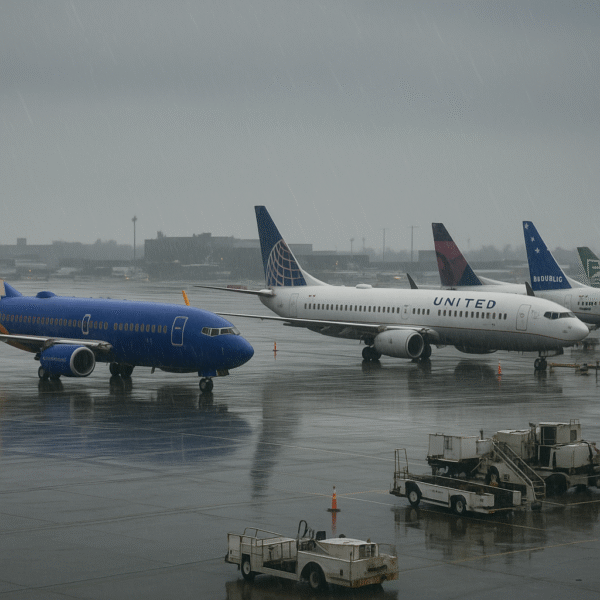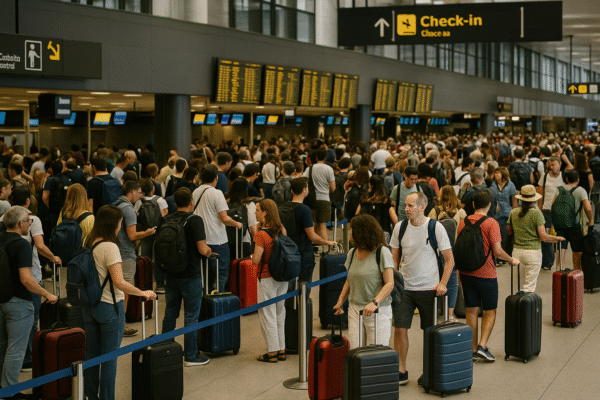Europe’s Air Travel in Turmoil as Strikes Paralyze Major Airports in Italy, Spain, and Portugal
Passengers flying across Europe this weekend are facing major air travel disruption as coordinated strikes sweep through Italy, Spain, and Portugal, severely affecting some of the region’s busiest airports and airlines. From Rome to Lisbon, labor unrest is sending shockwaves through the continent’s aviation sector just as summer travel peaks.
Italy Faces “Black Saturday” With Nationwide Walkouts
Italy is experiencing the most intense wave of industrial action, with unions calling for nationwide airport strikes on Saturday. Ground crews, baggage handlers, and support staff are walking off the job between 1:00 PM and 5:00 PM local time, paralyzing airport operations at key hubs including Rome Fiumicino, Milan Linate, Venice, Naples, and Florence.
Local media have dubbed the day “Black Saturday,” as passengers at Italy’s busiest travel gateways face extensive delays and cancellations. Milan Linate Airport is also grappling with additional pressure, as a major airport service provider joins the walkout, intensifying the disruption.
The strikes have been prompted by calls for improved working conditions, better wages, and enhanced safety protocols. Workers are demanding updated national labor agreements that reflect the increasingly strenuous demands of aviation jobs in post-pandemic Europe. Unions say the current conditions are unsustainable, citing staff shortages, excessive overtime, and poor treatment as major grievances.
Italy’s Ministry of Infrastructure and Transport has urged travelers to verify their flight status before heading to the airport and emphasized that efforts are underway to mediate a resolution between unions and employers. However, the short-term impact remains severe, with international carriers such as Ryanair, EasyJet, TUI, and British Airways warning of unavoidable delays and cancellations.
Spanish Airline Strikes Compound Chaos Across Europe
In Spain, labor action is also escalating. Pilots and cabin crew at major low-cost airlines, including operators serving over 100 destinations across Europe, are striking over stalled wage negotiations and job security concerns. Affected airports include Madrid-Barajas, Barcelona El Prat, and Palma de Mallorca, all vital entry points for tourists during Spain’s busy summer season.
Flight schedules have already been thrown into disarray, especially on routes between Spain and northern European cities. Travelers heading to popular holiday spots such as Ibiza, Valencia, and Malaga are being urged to reconfirm their flight itineraries and prepare for last-minute schedule changes.
The Spanish Ministry of Transport has stated that minimum service obligations will be maintained for essential domestic and international routes, though non-priority services are being suspended or delayed. In many cases, outbound and inbound connections with Italy and Portugal have been affected due to the cascading effect of shared airline networks and limited rebooking capacity.
Portugal’s Aviation Sector Also Hit by Strikes at Lisbon Airport
Portugal is not immune to the regional turbulence. Aviation service workers at Lisbon Humberto Delgado Airport launched a parallel strike over the weekend, demanding better employment protections and improved shift scheduling practices. As one of Europe’s fastest-growing transit hubs, Lisbon Airport is a key gateway for long-haul connections from the Americas, Brazil, and Africa.
The Portuguese Civil Aviation Authority (ANAC) has issued traveler advisories, confirming service disruptions at both Lisbon and Porto airports. A series of weekend strikes is expected to stretch throughout August, potentially affecting Portugal’s inbound tourism from the UK, Germany, and France.
Travelers have been advised to check with airlines and airport websites regularly, and international travelers connecting through Lisbon are encouraged to allow for additional layover time.
Implications for European Travel and Tourism
The timing of these strikes is particularly damaging as millions of European and international travelers take to the skies during the peak summer vacation period. The strikes risk straining airport infrastructure, airline operations, and tourism-based economies already recovering from the pandemic and battling staff shortages.
According to data from Eurocontrol, the European air traffic management agency, over 1,500 flights were delayed across the continent on Saturday alone. Italian and Spanish carriers are reporting cancellation rates exceeding 20% on some domestic and regional routes.
Airlines such as Ryanair, EasyJet, and Iberia have activated customer assistance protocols, allowing free rebookings and refunds, but many travelers are experiencing difficulty reaching customer service due to high demand.
Advice for Affected Passengers
The European Commission reminds travelers of their rights under EU Regulation 261, which entitles passengers to compensation or assistance in the case of significant delays, cancellations, or denied boarding. However, exceptions apply in cases of “extraordinary circumstances” such as strikes by third-party staff.
Passengers are urged to:
- Check airline websites or apps regularly for updates
- Arrive at the airport earlier than usual
- Be flexible with connections or travel dates
- Monitor news from relevant transport ministries and aviation authorities
For the most accurate updates, travelers should refer to:
- ENAC – Ente Nazionale per l’Aviazione Civile (Italy)
- AENA – Spanish Airports Authority
- ANAC – Autoridade Nacional da Aviação Civil (Portugal)
Looking Ahead: Labor Tensions in European Aviation Sector
The current strike wave highlights deep-seated tensions in Europe’s aviation industry, where employees are increasingly demanding more equitable treatment amid soaring airfares and booming travel demand. Analysts predict that unless new labor agreements are reached soon, similar disruptions could resurface later this summer or during the year-end holiday season.
For now, European air travel remains volatile. Passengers planning to fly within or into Southern Europe should remain vigilant, flexible, and informed to navigate the ongoing chaos with as little stress as possible.
For more travel news like this, keep reading Global Travel Wire


















